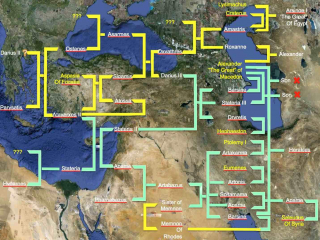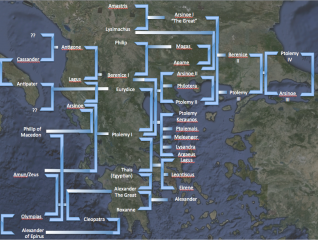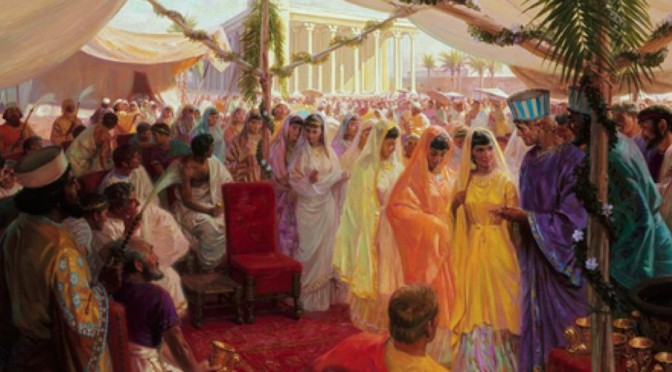The Macedonian Eqyptians married the Persian Egyptians to reunite the bloodlines. The Egyptians had won!
A mass marriage
 The Marriage at Susa. See segmentAlexander was determined that he would obtain control of the whole of the civilised world. And he wanted that control for Egypt; he wanted universal acceptance of Eqyptian God’s, Egyptian Priests, the Egyptian way of life. He ordered all his generals and captains to marry Persian women.
The Marriage at Susa. See segmentAlexander was determined that he would obtain control of the whole of the civilised world. And he wanted that control for Egypt; he wanted universal acceptance of Eqyptian God’s, Egyptian Priests, the Egyptian way of life. He ordered all his generals and captains to marry Persian women.
Alexander himself married four of the daughters of the Persian Royal family, and had children by three of them. It is who he married which is interesting.
Roxanne
Alexander pursued Roxanne to the edge of the known world and made her father, and there are some different spellings of his name, one of his Satraps or State Goveners. He committed five hundred of his best men to the siege and capture of the the pillar of Sogdiana(modern day Uzbekistan) where Roxanne had taken refuge and lost fifty of them. Conventional history tells us that Alexander was captivated by stories of her beauty.
In fact he was a product of the Egyptian Line breeding program. he would only have been interested in products of the same program! It follows that Roxanne was a product of the same program! But she was Persian wasnt she? On the diagram the yellow links are between members of the Persian royal family who are almost certainly Egyptian. For this to be true the wife of Oxyathres and Ostanes would have to be Egyptian and in fact there is no record of who they were.
A second Aspasia
The mother of Sigamis and Artossa would also have to be Egyptian. Her name is Aspasia. Aspasia is particularly interesting. Historians say that she cannot be the same Aspasia who was Pericles lover as the dates don’t match.
However, Pericles’ Aspasia was last heard of in Athens in 426 BC. She would have been at the most 25 years old. Ataxerxes II would have been 9 years of age at the same time. A marriage between the two at some later date would have eminently possible. Pericles’ Aspasia was beautiful. well educated, politically adept, a good match for any man. During her life in Athens She persuaded Pericles to attack Sparta. By a system of subsidies Ataxerxes also encouraged Athens, Thebes and Corinth to attack Sparta, but then when Sparta was on its knees, he switched his support to Sparta, ensuring that all the Greek states were weakened by the conflict.
Ataxerxes’ Aspasia is recorded as coming from Phocaea, relatively close to Miletus, and also with strong contacts in Egypt. It is also extremely possible that this Aspasia is the daughter of Pericles’ Aspasia. ( Incidentally from what we know of her she would not have liked being distinguished in this way. She would have preferred a history in which the leader of Athens was known as Aspasia’s Pericles.)
Does circumstantial evidence support this conclusion? It certainly does. Roxannes sister married Lysimachus and their daughter was Arsinoe I
Arsinoe I
 Arsinoe I was the ” new mother” of the Egytian pharohs Her son was Ptolmemy II and some Historians believe that she and not Apame was the mother of Berenice II, Ptolemy II’s wife. This belief comes from egyptian inscriptions which record them as Brother and sister. Not that it makes a great deal of difference Arsinoe I was the daughter of Lysimachus, Apame was the grand daughter of Secleus. they both were the results of unions made at the marriage feast at Susa, They were both part of the Egyptian bloodline
Arsinoe I was the ” new mother” of the Egytian pharohs Her son was Ptolmemy II and some Historians believe that she and not Apame was the mother of Berenice II, Ptolemy II’s wife. This belief comes from egyptian inscriptions which record them as Brother and sister. Not that it makes a great deal of difference Arsinoe I was the daughter of Lysimachus, Apame was the grand daughter of Secleus. they both were the results of unions made at the marriage feast at Susa, They were both part of the Egyptian bloodline

Hephaeston
Seleucius himself was apparently another “miraculous” birth, in this case Apollo was his father. In the diagram showing the genealogy of those who took part in the marriages at Susa it can be seen that Apame falls outside of the yellow links. The green links show another possible Egyptian line which would require Hydarnes wife and the sister of Memnon of Rhodes to be Egyptian. Alexander himself, his closest friend Hephaeston and Ptolemy all married members of this line.
Hyphaestion was an Egyptian prince. He arrived at Aristotle’s school from a mystery location, he was named after a god and he was Alexanders closest companion some said lover.
And so, to Ptolemy
Ptolemy was born from another Miraculous birth, this time to another wife of Philip of Macedon who was also called Arsinoe. He had to be egyptian as the preists in Egypt accepted him as Pharoh immediately after. Ptolemy diverted Alexanders burial from Macedon to Egypt, something an Egyptian would have done. Unfortunately it destroyed the uneasy peace between Ptolemy and the Macedonian generals in Alexanders Army. The war of the Diadochi, the war of the successors had commenced
